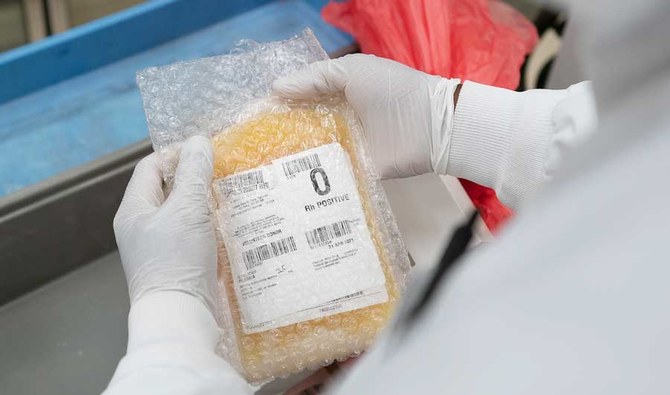JEDDAH: More than 100 people infected with the coronavirus have been treated through blood plasma samples from patients who have recovered from the virus, the Saudi Ministry of Health said on Friday.
The initiative is part of a study involving several research centers in the Kingdom, with 512 donors from Riyadh, Eastern Province, Jeddah and Madinah. This indicates the Saudi community is highly invested in supporting the treatment.
The ministry said that blood plasma contains antibodies that help the body to heal. When a patient recovers, his plasma is used on an infected person, which can form a defense against the virus, especially as a cure is yet to be discovered.
The blood plasma treatment has been used before in China and other countries, but its efficacy levels have not been tested through documented clinical studies.
Saudi Arabia approved the initiative early in April and a team was assembled from the ministry, National Guard Hospitals, King Faisal Specialist Hospital, Armed Forces Hospital, university hospitals, Johns Hopkins Aramco Healthcare, as well as from the private sector.
The ministry confirmed that the research team was working around the clock to expand the initiative’s scope and launch it across the Kingdom by acquiring donors, which is done through Twitter and via email or phone.
To date the official website has had 14,000 visitors, inside and outside the Kingdom, who have showed interest in the study.
Initial tests of the plasma’s antibodies, health history, vital signs and diagnosis are taken before treatment begins.
FASTFACTS
• The total number of coronavirus cases in KSA reached 201,801.
• The total number of recoveries in the Kingdom reached 140,614.
Donors need to pass these tests for their plasma sample to be used on a COVID-19 patient safely. After that the recovering patient’s progress is monitored to further the research and determine its potency.
The donated plasma sample, usually amounting to 400ml to 700ml, is reliant on the donor’s weight and health. The sample is treated in blood banks to reduce microbes and put into two bags, each working as a single treatment dose. Patients are then treated with a single bag each day, and treatment is usually over a maximum of five days.
Meanwhile, the Kingdom recorded 50 new COVID-19-related deaths on Friday, raising the total number to 1,802.
There were 4,193 new cases reported in Saudi Arabia, meaning 201,801 people have now contracted the disease. There are 59,385 active cases; 2,291 of them are in critical condition.
According to the Health Ministry, 431 of the newly recorded cases were in Dammam, while Al-Hofuf recorded 399 and Riyadh recorded 383.
The ministry also announced that 2,945 more patients had recovered from the coronavirus, bringing the total number of recoveries in the Kingdom to 140,614.
The ministry urges those who have come into contact with an infected person to immediately isolate themselves and call 937.




























